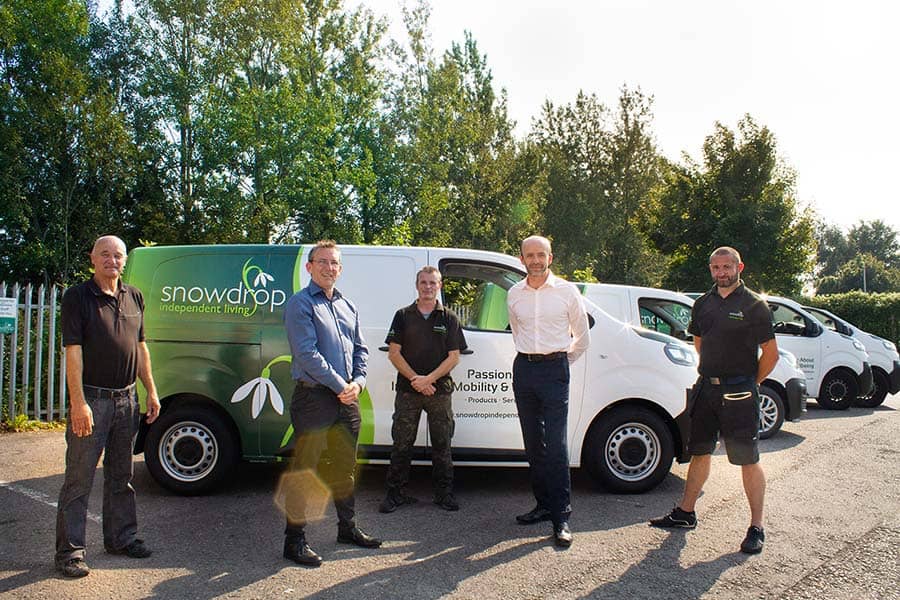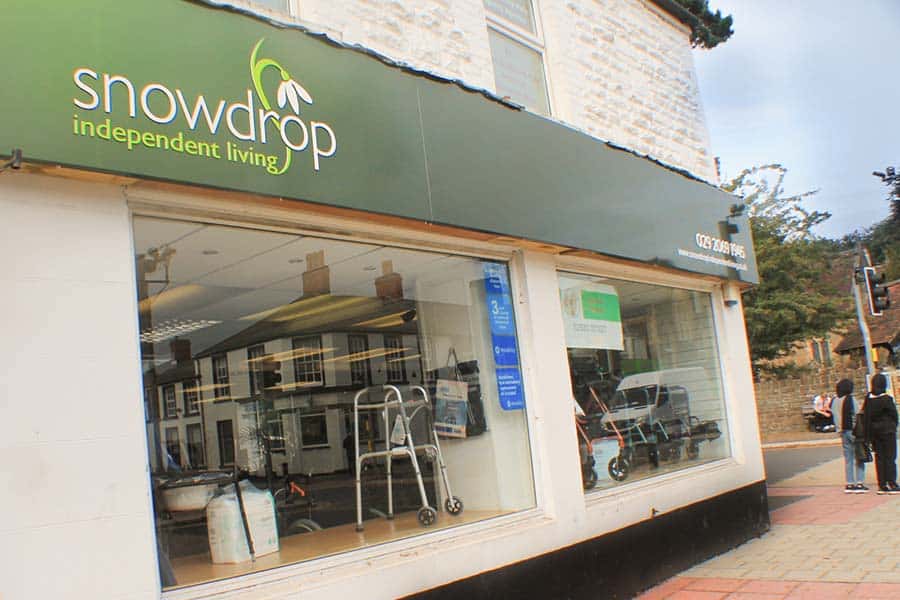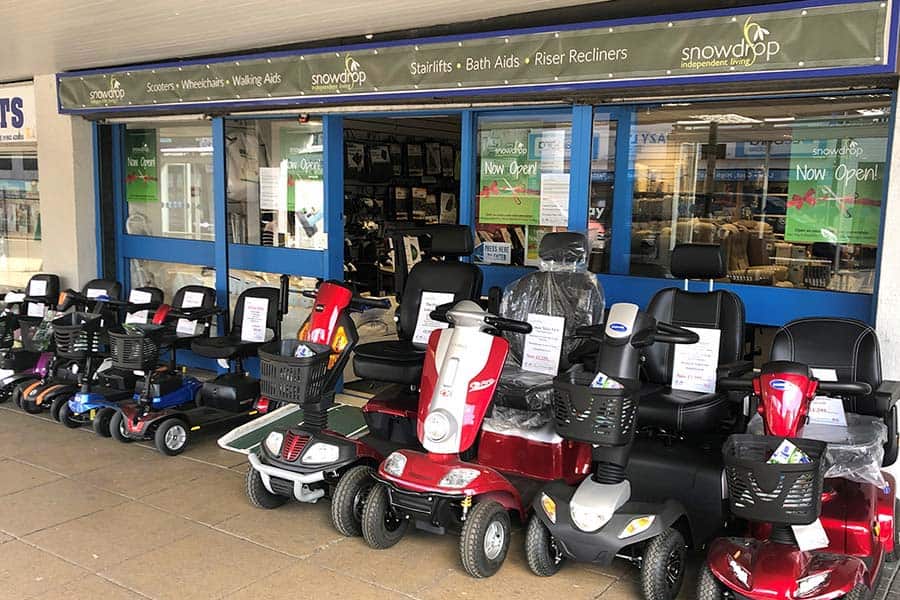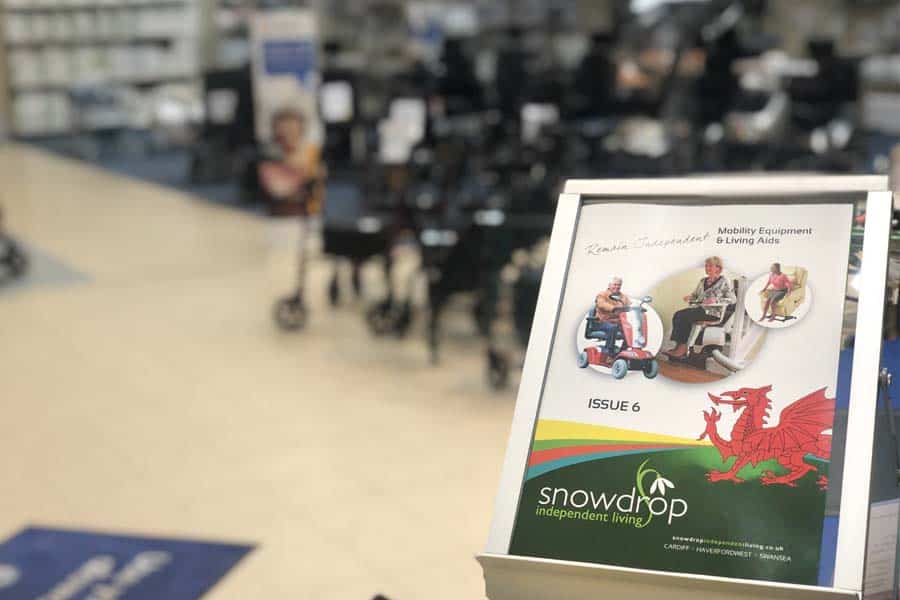Retailer Spotlight: Snowdrop Independent Living

A blossoming retailer

Facing exceptional challenges in exceptional times, David Morgan, Managing Director of Snowdrop, discussed where the retailer finds itself after a rollercoaster year and a half, as well as its ambitions for the future.
The growth of Snowdrop
Founded in 1999 by Peter O’Shea, Snowdrop Independent Living grew from a single showroom in Pembrokeshire to three branches operating across South Wales by 2019.
After two decades of successfully developing the business, Peter began considering retirement and what the future of the company would be, with thoughts of a potential trade sale or a management buy-out (MBO).
Deciding that a natural MBO was not on the cards, Peter and the senior management team at Snowdrop decided to look externally for business leaders who may be interested in entering the mobility arena.
The timing proved fortuitous, as David Morgan, Snowdrop Independent Living’s new Managing Director, explained: “I had been looking for a business that did something useful for a while and this seemed to tick all the boxes.”
With a background spanning a wide range of different sectors, from biotech and industrial automation through to financial services, David emphasised that the shift to the dramatically different realm of mobility was a welcome change.
“Even before I knew the name of the company, I knew the sector it was in and it certainly seemed worth learning more about,” he continued.
“Kevin Bounds, our chairman, was also approached about the same time and we met each other. Even before we met Peter O’Shea, we agreed that this was something worth pursuing as an acquisition.”
Meeting with the rest of the senior managers at the Welsh retailer, David and Kevin built the buyout team and, with the support of a £500,000 equity investment by the Development Bank of Wales, completed a successful MBO in April 2019.
Managing the transition
The departure of its long-standing owner marked a big shift for Snowdrop. Aware that the transition of new leadership and ownership could be potential to be a catalyst of anxiety among staff, David and Kevin made a point of bringing the team along the journey.
“When we came in, we made sure we had met the team many times and ensured to openly share our plans for the company with the team, as well as how we would work together,” detailed David.
“That transparency and structure were essential for everyone.”
Helping to enable a smooth transition, Peter also stayed on, providing a familiar face and a degree of business continuity.
“Of course, Peter O’Shea stayed on board along the way,” said David.
“That is very much less now but during the transition, Peter acted as an advisor and carried out some of the tasks he enjoyed – mostly around customer relations and doing some jobs for us. It was a really useful part of the transition and it freed him to be able to do the elements of the job that he genuinely enjoyed, rather than being bogged down in the business side.”

An opportunity to grow
For many, the early months of taking over a business would be a time to get their feet under the table. However, when an opportunity came knocking, Snowdrop’s new MD knew better than not to answer.
After just eight months after completing its MBO, the Welsh mobility and access specialist completed its first acquisition. In November 2019, Snowdrop had taken over Hearing Health and Mobility’s Cardiff branch.
“They approached us to take over the Cardiff, rather than us looking for acquisition targets,” recounted David.
“They read one of our press releases and it mentioned our expansion plans so they contacted us and we came to an arrangement. In the end, that was a very simple deal.”
The acquisition would prove a good project for the retailer to cut its teeth on, ready to jump at the next opportunity that would present itself soon after in the spring.
“It was good practice because when Hearing Health and Mobility entered administration and its other four branches became available, we had the confidence to acquire the cluster of three stores in the West Midlands,” reflected David.
“Again, it was completely opportunistic. There were certainly no plans to buy the branches back in April and we hadn’t identified them as acquisition targets. It was more a case of: ‘Yes, we can think we can do this and we think we can build on it’.”
In February 2020, weeks after its Cardiff acquisition, Snowdrop snapped up Hearing Health and Mobility’s Brierley Hill, Wolverhampton and Hall Green stores, alongside welcoming 10 new members to its growing team.
Sprouting up in the Midlands
In just under a year, Snowdrop Independent Living had more than doubled its store portfolio from three to seven while also entering England for the first time.
Stressing that the rapid growth was a case of being in the right place at the right time, David suggested that the retailer’s mobility focus will enable it to cultivate a successful retail presence where its predecessor had struggled.
“A combination of focus and experience is where I think we are different,” he emphasised.
“Our focus is all about mobility, whereas Hearing Health and Mobility’s focus was more about hearing. By drilling down on mobility, all of our efforts will be on best-serving customers in the market for those products. That’s our primary aim: Providing the best customer service possible.
“We are a firm believer that this industry is just as much about advising as it is about selling; I believe those companies that are successful have this idea very much at the heart of their businesses.”
With mobility in mind, David and Snowdrop set about absorbing its new branches into the expanding group, investing in new systems, refurbishing premises, recruiting more staff and expanding product portfolios.
“It was an expensive exercise for us and, honestly, we didn’t cover costs but it felt like the right thing to do…” David Morgan
Just like its MBO, David stressed that a successful acquisition starts with the people.
“The first thing we did when we took over the Hearing Health and Mobility stores was meet all the people. I can’t stress enough that all business is about people,” he reaffirmed.
“Having met the team in the West Midlands, it was clear they had been not well attended to. The fact that we were there and ready to listen to their ideas and address their concerns showed them that we were going to give them the support they needed.”
With the West Midlands a reasonable distance from the company’s established South Wales base, the first port of call for Snowdrop was to bring aboard a manager to cover the region.
“We have a great manager covering the Midlands who joined us from another part of the retail world,” stated David.
“He is a perfect conduit between the head office in Wales and the stores in the West Midlands. That was essential. Managing something that had not been well-managed in the past remotely was always going to be very challenging so establishing that local link was vital.”
After acquiring the stores, it became immediately clear to the Snowdrop team that its new branches were lacking a very key element to success: products. Quickly, the retailer moved to bring in new ranges to ensure it could compete in the busy West Midlands mobility scene.
“The stores had been understocked so we were in a process of getting the products into the branches that we felt the customers would want to buy, rather than the bare minimum,” highlighted David.
“That was what we were doing for the first weeks after the takeover, getting products to those branches as fast as we could. Then, the world seemed to stop.”

An unexpected drought
Normally, one MBO and four new branches would be where the story would end after just 12 months. However, in March, a once-in-a-lifetime pandemic risked derailing Snowdrop’s exciting 2020 plans.
“We completed the acquisition on 6 February, less than eight weeks before the lockdown: Talk about timing!” exclaimed David.
“On the day lockdown was announced, we actually closed all of the stores while the senior management team got our heads together – by phone – and decided what to do next.”
In those early days, confusion surrounded the mobility industry as to whether retailers fell into the ‘essential’ category of retail. After some deliberation, the team decided to reopen its doors to customers.
“Probably one of the hardest things at the beginning and along the way was having to interpret the government’s rules, rather than having them clearly defined,” remembered David.
“I’m confident that we did the right and proper thing by reopening the stores so that the vulnerable customers we served were able to buy vital products. In particular, incontinence products, mobility aids, as well as our service provision to maintain equipment in homes.
“One anecdote from our stores was that they had a customer standing at their door in tears because they were overwhelmed with relief by being able to buy continence pads for their mother – it’s stories like that which remind us why what we do is so worthwhile and essential.”
It was a decision that would not come without consequence. Footfall and sales were down dramatically throughout lockdown. While staying open was not necessarily the most financially advantageous move, however, it was ethically the right decision, said David.
“We made the decision knowing the financial impact,” he confirmed.
“Admittedly, we shortened hours and days we remained open and we found customers really appreciated it.”
After being closed for only half a day before reopening, the retailer acted quickly to introduce steps to try and minimise the risk to staff and customer.
“We kept on a skeleton staff but it was impossible to plan in those very early days as we didn’t know what was going to happen next,” added David.
“There was so much uncertainty and the situation seemed to be evolving by the hour! Our staff were incredible throughout the whole time though.
“It was an expensive exercise for us and, honestly, we didn’t cover costs but it felt like the right thing to do and that is really what counts when we look back.”
Tending to a budding new proposition
Even with stores operating on reduced hours, members of staff on furlough and unprecedented disruption, Snowdrop managed to launch a new e-commerce platform during the lockdown.
“We already had a plan for producing an online presence and had plans to launch something quite grand,” commented David.
“However, with lockdown in effect, we decided to massively accelerate that project.”
Scaling back its big ambitions, the retailer instead decided to break its e-commerce plans down into stages to ensure it did not miss out on the opportunity to offer its customers a digital option during the height of the outbreak.
“Stage one was just to get it working!” he stressed.
“We actually recruited during lockdown to help get it live which was an interesting process. That stage was delivered successfully and we now have an online retail presence and distribution from one of our branches. It is working and we have happy customers.”
Importantly, Snowdrop decided to sell only a limited range of product online, with David having a clearly defined distinction regarding which ranges would and would not be available to purchase over the internet.
“Products where the customer benefits from having a personal assessment, we do not sell online. It is that simple and it is a policy we set right at the start,” he outlined.
“Products that are not particularly subjective as far as their touch and feel are concerned – i.e. products that when they turn up at a customer’s door are exactly the same as the description and image online – we sell online.
“I think our online proposition will grow from where we are now. We still have the ambition to something a little grander so it is very much a ‘watch this space’ situation.”
Despite seeing e-commerce playing a far greater role in its retail mix in the future, David refuted the idea that the world of mobility retail will rapidly shift completely from bricks to clicks.
“I think e-commerce will become an important part of our business but the ability to assess and understand the customers’ needs to best be able to advise solutions for them will always be the core of the Snowdrop business model,” he pointed out.
“Our business is built on our people being able to provide that extra bit of service, advice and empathy that is incredibly difficult to replicate online.”

Green shoots
Just like the flower it is named after, Snowdrop proved to be resilient during winter/spring and found a way to stand strong despite the harsh environment. Coming through a Q2 in lockdown, the retailer joined the rest of the country in looking ahead to rebuilding and recovering in Q3.
“One of the things that acquiring the Midlands stores taught us is that there it makes sense to operate in clusters” David Morgan
Fortunately for Snowdrop, its decision to continue trading throughout the lockdown meant its staff and customers were already well acclimatised to operating under pandemic conditions long before the government issued its COVID-Secure guidance.
“We established one-way systems very quickly and some of our stores were already well-positioned to work like that so it made it an easy measure to introduce,” noted David.
“Almost immediately, we put up barriers between staff and customers as well.
“By that first morning of lockdown, every store had hand sanitiser by the door because we were lucky enough to already have a lot of those products in stock. By March, we had also started to consider the impact of the pandemic and knew some form of lockdown rule could be on the way, so we had tried to prepare accordingly.”
By July and August, Snowdrop had started bringing more of its team back, and, according to David, saw a promising rise in revenue and footfall throughout the third quarter.
“It was difficult to forecast what a good or bad recovery might look like because we hadn’t really got anything to compare it to,” continued David.
“Normally, we would compare against the same month or same period in the previous year but, clearly, recent months have been incomparable to anything else.
“That being said, we are satisfied, given everything that has happened in the world, with how our last quarter looked.”
In particular, David noted that the return of the company’s engineering business, predominantly its stairlift and outdoor platform lift segments, helped to drive much of its recovery. Mostly, it was housing associations and councils that had been slower to get up and running that led to the increase in activity as the public sector gears began turning again.
Built-in resilience
Despite a strong third quarter, uncertainty over the final months of the year still hangs over the country as coronavirus commotion looks set to ramp back up. Interestingly, David highlighted that the mobility retail industry may prove to be more resilient than others in the face of further disruption.
Often, it has been said that marketing mobility products are difficult because people purchase out of ‘necessity’ rather than desire.
“The positive, I suppose, is that somebody that needed a stairlift in February but didn’t order it, still needs a stairlift now and are due to order it,” suggested David.
“It is the nature of this business; people’s needs do not disappear. It can be difficult to get people to take that step to buy equipment, be it something portable or installed, but once that decision has been reached, it tends to be a ‘must-have’.”
The post-lockdown terrain
Attempting some future-gazing and imagining a time when the pandemic will be a distant memory, David suggested that a shift in the sector may be in the cards after the coronavirus dust has settled.
“It is difficult to predict because of just how much uncertainty there is but one thing is for certain: the sector will survive simply because it has to. The work this industry does to help vulnerable people to live fuller, richer and more independent lives is too important not to go on,” he said.
“There may be a possibility that some of the independents in the sector, however, may start to question whether they want to spend the next half a decade trying to rebuild their businesses back to where they were pre-COVID.
“In that event, we may see any number of different outcomes. Some may simply close their doors, some may look to sell and some may very well be up for the fight, coming out lockdown as a stronger and more resilient business: I very much intend to be in that latter group.”
Snowdrop patches
With one MBO, four new stores, one new e-commerce platform and one lockdown successfully navigated, the company has overcome more challenges in a year and a half than many face over a decade.
Discussing if a push for more stores and a potential push for a national presence could be in the pipeline, David stressed the importance of crawling before walking. Nevertheless, he noted the months to come will not see the company be any less ambitious in its growth plans.
“One of the things that acquiring the Midlands stores taught us is that there it makes sense to operate in clusters,” said David.
“Our Midlands’ and South Wales’ stores are clusters, which enables those teams to work together and support each other. Clusters lend themselves to that so I see us taking that kind of approach as we look to expand, be it through acquisition or organic. I certainly don’t see us opening individual, satellite stores which are miles away from other clusters.”
Spreading more seeds
Growing from three to seven stores in about a year, Snowdrop Independent Living has been busy establishing its newly-expanded network in their respective localities. Not one to miss out on an opportunity, however, David said the company is always open to having discussions.
“There is an element of taking a breath and taking stock of where we currently are but the model we are developing in Snowdrop is one that I’m confident will reproduce,” he noted.
“So, we are certainly not putting expansion plans on hold and will always consider opportunities, be that be through acquisitions or identifying locations which are poorly served and are ideal for organic growth. That is very much on the agenda.”
A rosy outlook for Snowdrop
Despite the uncertainty that faces the industry over the coming months, Snowdrop has proven that it is more than capable of flourishing during periods of exceptional change.
According to David, this ability to remain resilient and adaptable is down to the people that make the retailer what it is.
“I would just like to finish by saying how proud I am of our staff because every one of them has been through an extraordinary amount of change over the past 18 months,” he concluded.
“They’ve all gone through the change of new ownership and they really have come on the journey with us.
“It almost feels like there is now a stronger, emotional connection between our employees and the business. I know it sounds cliché but I would say that it feels like we have become a family and are now ready to face whatever the future holds.”
www.snowdropindependentliving.co.uk


